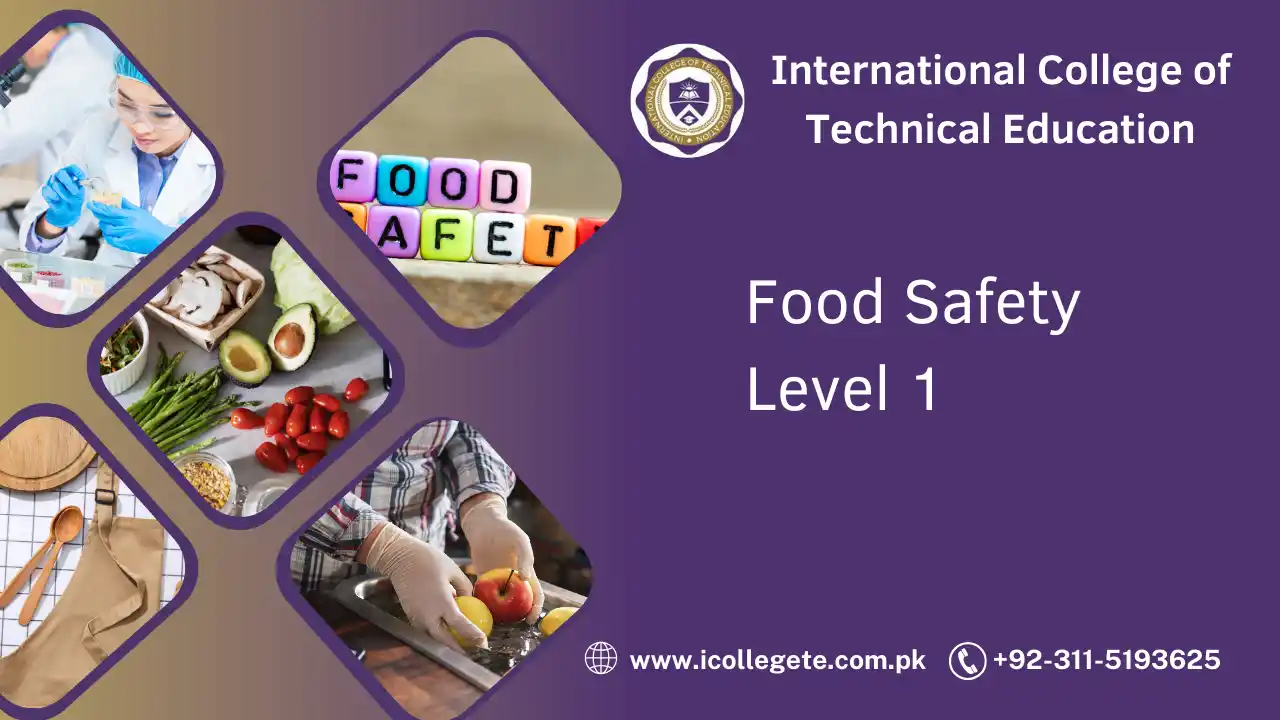Food safety is critical to ensuring public health and preventing foodborne illnesses. The Food Safety Level 1 Course is designed to provide foundational knowledge about food hygiene and safety practices, especially for those who are just beginning their journey into the food industry. This course is ideal for individuals working in food handling environments, such as restaurants, catering services, and food retail. By completing the Food Safety Level 1 Course in Lahore, participants will learn the basic principles of food hygiene, legal requirements, and how to implement proper food safety practices.
The Food Safety Level 1 Course offers essential training to help food handlers understand the importance of food safety and hygiene in preventing contamination and safeguarding consumer health. This entry-level course covers the fundamental aspects of food safety, including personal hygiene, food storage, cleaning and sanitization practices, and the importance of avoiding cross-contamination.
The course is ideal for individuals working in entry-level food industry positions, where they will directly handle food or contribute to its preparation, storage, or service. It ensures that all food handlers are equipped with the knowledge to maintain high standards of food safety, which is vital to the reputation and success of food-related businesses.
Course Overview
The Food Safety Level 1 Course is a comprehensive introduction to the basic concepts of food safety and hygiene. It is aimed at individuals working in low-risk food environments or those who are new to the food industry. The course focuses on the importance of proper hygiene and the prevention of foodborne illnesses. Participants will gain practical knowledge that they can apply immediately in their daily tasks, helping to ensure that food safety standards are met at all times.
The course is designed to be accessible and easy to understand, using real-world examples and case studies to help reinforce key concepts. After completing the course, participants will have a clear understanding of their responsibilities as food handlers and the importance of maintaining a safe food environment for customers and staff.
Study Units
The Food Safety Level 1 Course typically consists of the following core study units:
- Introduction to Food Safety: Understanding what food safety is, why it is important, and how it affects public health and well-being. Participants will learn the basic principles of food hygiene.
- The Importance of Personal Hygiene: An in-depth look at the personal hygiene practices that food handlers must follow, including hand washing, wearing appropriate attire, and maintaining cleanliness to avoid contamination.
- Foodborne Illnesses and Hazards: An overview of common foodborne illnesses and the types of hazards that can contaminate food. This unit covers biological, chemical, and physical hazards and how they can be prevented.
- Safe Food Handling Practices: The procedures for handling, preparing, and serving food in a safe manner. This includes avoiding cross-contamination, keeping food at safe temperatures, and using clean utensils.
- Food Storage: The correct methods for storing food safely to prevent contamination and spoilage. This includes proper temperature control and separation of raw and cooked foods.
- Cleaning and Sanitizing: Understanding the importance of cleaning and sanitizing equipment, surfaces, and utensils. This section also covers the use of appropriate cleaning agents and disinfectants.
- Food Safety Regulations and Legislation: An overview of relevant food safety laws and regulations, including food handling standards set by authorities such as the Food and Drug Authority (FDA) or local regulatory bodies.
- Recognizing and Preventing Cross-Contamination: How to avoid the transfer of harmful bacteria and allergens between different types of food. This includes cleaning procedures and food handling protocols.
Learning Outcomes
Upon successful completion of the Food Safety Level 1 Course, participants will be able to:
- Understand the fundamental principles of food safety and hygiene.
- Recognize the various types of foodborne hazards, including biological, chemical, and physical contamination risks.
- Implement basic food safety practices, including proper handwashing techniques, food handling, and storage.
- Identify safe food temperatures for storing and serving food.
- Practice cleaning and sanitizing procedures effectively to prevent cross-contamination.
- Apply food safety laws and regulations in a food handling environment.
- Contribute to creating a safer food environment by adhering to established safety standards and procedures.
- Understand the importance of personal hygiene in maintaining food safety and preventing contamination.
Course Benefits
The Food Safety Level 1 Course offers numerous benefits for both individuals and organizations:
- Essential Food Safety Knowledge: Participants gain foundational knowledge of food hygiene and safety, which is crucial for anyone involved in food handling and preparation.
- Industry Recognition: The course provides a certification that is recognized within the food industry, enhancing an individual’s employability and demonstrating their commitment to maintaining food safety.
- Risk Reduction: By understanding and applying proper food safety procedures, participants help reduce the risk of foodborne illnesses, ensuring the health of consumers and preventing potential legal or reputational issues.
- Improved Food Safety Practices: This course enables individuals to implement food safety practices in their daily work, helping businesses maintain a high standard of hygiene and quality control.
- Cost-Effective Training: As an entry-level course, it offers an affordable way for businesses to train their employees in essential food safety practices without significant investment.
- Regulatory Compliance: The course ensures that food handlers are aware of the relevant regulations and standards they must comply with, helping businesses stay compliant with local food safety laws.
- Career Opportunities: For those entering the food industry, the course provides a qualification that can open doors to a range of job opportunities in the food sector, including restaurants, catering, and food retail.
Who Is This Course For?
The Food Safety Level 1 Course is ideal for:
- New Food Handlers: Individuals who are new to the food industry and need basic food safety training before starting work in food handling roles.
- Restaurant and Catering Staff: Employees working in kitchens, food preparation areas, or food service environments who need to learn essential food hygiene and safety practices.
- Retail Food Workers: Staff in supermarkets, food retail outlets, and convenience stores who handle, prepare, or sell food products to customers.
- Hospitality Workers: Individuals working in hotels, cafes, and restaurants who need to understand food safety to maintain safe and hygienic conditions for guests.
- Small Business Owners: Entrepreneurs running small food businesses who need to ensure their staff understands basic food safety procedures to meet legal requirements and industry standards.
- Anyone Interested in Food Safety: Individuals who want to improve their knowledge of food safety for personal or professional reasons.
Future Progression
Upon completing the Food Safety Level 1 Course, participants can progress to more advanced qualifications in food safety and hygiene:
- Food Safety Level 2 and Level 3: These advanced courses provide deeper knowledge of food safety practices, risk management, and more complex food safety systems. Level 2 is suitable for those looking to take on more responsibility, while Level 3 is aimed at supervisors and managers who oversee food safety systems.
- Advanced Food Hygiene Courses: For those seeking to specialize in food safety, there are various advanced courses covering specific areas, such as allergens, HACCP (Hazard Analysis and Critical Control Points), or food safety management systems.
- HACCP Training: A globally recognized certification, HACCP training is for those working in food safety management and wanting to develop skills in identifying and managing food safety risks within a system.
- Food Safety Management: Individuals can pursue certifications in food safety management systems to enhance their ability to lead teams and ensure compliance with international food safety standards.
- Food Technology and Quality Control: For those looking to move into technical roles, further education in food technology or quality control can open doors to more specialized and managerial positions within the food industry.
- Health and Safety Qualifications: Transitioning from food safety, individuals may also pursue broader health and safety management qualifications to manage health and safety across various industries.
The Food Safety Level 1 Course in Lahore provides essential knowledge and skills for individuals working in food handling, preparation, and service. With a focus on basic hygiene practices, food storage, and contamination prevention, this course ensures that food handlers meet industry standards and comply with safety regulations. Whether you are new to the food industry or looking to formalize your food safety knowledge, this course offers the perfect foundation to enhance your career and contribute to a safe food environment.
Enroll in the Food Safety Level 1 Course today and take the first step towards becoming a certified food safety professional, ensuring the health and safety of consumers while enhancing your career opportunities in the food industry.







